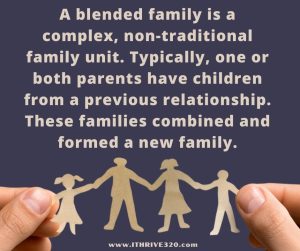Shakirah Hunter

We often hear the term ‘blended-families’ used to describe families that merge with each other post loss of a loved one, whether through divorce or in the case of a death. This word ‘blended’ serves to give us the understanding that there is a true integration of each party to create a new family unit. After experiencing high levels of loss -families are often left bruised emotionally and need to heal. As time goes along the gaping absence of a loved one pushes people to look for companionship, for comfort from a new family bond. This may happen in different forms, different ways and is never a one size fits all. Sometimes a single woman marries a man who has lost his wife and now she gains a new family with both children and a new husband at the same time. At other times, two families might merge to create an entirely new bond both with children of their own.
This integration of two families -post loss – is one of the most beautiful aspects of our Deen. Allah Ta’ala permitted for us to remarry as the need for companionship and support and even simply a ‘family’ is a need that creates stability and tranquility in our lives.
In the life of the Prophet Muhammed (s) we see how the merging of families was a part of a larger goal of building a society that was balanced and focused on developing the family unit. Khadijah (ra) prior to being married to the Holy Prophet (S) had a daughter by the name of Hind from her first marriage and from her second marriage she had Hind, Haala and Taahir. History has recorded that all of them accepted Islam highlighting to us that they were a part of the life of the Prophet (s) and Khadija(ra).
Later at the death of Khadijah (ra), the Prophet (s) proposed to marry a widow Saudah bint Zam’ah who had five or six children with her husband Sukran (ra) , but she was a bit doubtful in accepting His hand in marriage. The prophet (S) asked her what held her back and she very frankly explained to him that she was afraid that her children would cry on his head day and night. The Holy Prophet (S) made certain that was the only reason and nothing else. At the time they were both recently widowed and she herself needed financial assistance whilst the Prophet (s) needed assistance in running his household and a companionship in the moments of loss. There are many examples from Islamic History that highlight to us the merging of families to create love, support, and tranquility in the home.
Blended families come with a lot of challenges and tests.
It is never possible to have a home that has no conflict but how do we create a space that allows children to feel loved, valued and heard in this new space?
Reassure children that they come first. We must listen to understand the opinion of our children. Value their opinion in the new marriage. Most importantly, show your children your vulnerability and the way that you feel going into this new chapter.
As Muslims we must understand that the blended family must be one of integral respect and kindness.
Love might take time to build – however we should create an environment that a child feels safe and secure. You must give them the same love that you were giving previously, constantly making sure that you are emotionally connected to them – under the banner of justice. Your heart might prefer your own children over your stepchildren, or you might take your children’s part over your new spouse. To build this new home your guideline should not be your own feelings but rather developing qualities of mutual respect – irrespective of whether your heart might have developed a deep attachment or not.
Ensure that you have created a strong marriage between you and your second husband or wife. When the marriage is strong then children feel the ability to express themselves and confident in this new home.
Accept that children at different ages will react differently. Usually, younger children below the age of ten love to be a part of a family unit and find it easier to adapt to the new family. On the other hand, teenagers might be quiet and unable to express their feelings. In understanding that each person might be different and bring something different to the table- we move away from forcing everyone to accept the new union at our pace – rather we allow them to develop at their own emotional growth.
The new family unit allows for a deep sense of connection and growth when we focus our responses and our understanding on the principles of kindness and understanding. We must understand that the new family unit will never be the same as your first marriage and at the same time it doesn’t take away the love and bonds of the first marriage.
Finally remember that dua is your greatest weapon for every little squabble , or massive emotional outburst. As you all navigate this new chapter understand that Allah has placed you with your new family and it is He who is able to assist you in navigating it and overcoming every challenge.






0 Comments